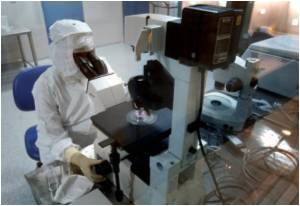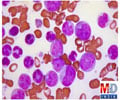Scientists have discovered the role two enzymes that play an important role in the development of lymphoblastic leukemia.

The dual inhibitor was developed by Gilead Sciences.
T-ALL is a cancer that arises during the development of T-cells, a type of white blood cell. The abnormal T cells multiply rapidly, invading and impairing the function of organs critical for sustaining life. T-ALL typically begins in childhood but can also appear later in life. The disease is caused by mutations in DNA, which permit the cancer cell to continue growing and dividing, when a healthy cell would normally die. Left untreated, T-ALL is invariably fatal. It is highly resistant to chemotherapy, compared with other forms of leukemia. The relapse rate is about 25 percent in children and 50 percent in adults.
In studies of autoimmune disease done some years ago, Dr. Diacovo and his team found that inhibition of both PI3K gamma and delta not only reduced inflammation but also caused developing T cells to die at an accelerated rate. "This led us to ask in what disease states it would be advantageous to kill off aberrant T-cells," he said. "One of the first diseases that came to mind was T-ALL."
The current study was designed to take a closer look at the role of these enzymes in T-ALL and to see whether an experimental PI3K inhibitor called CAL-130 might affect disease progression.
In the first part of the study, using a mouse model of the disease, Dr. Diacovo and his team, led by Dr. Subramaniam, confirmed that both PI3K gamma and delta are essential for the development of T-ALL and the survival of leukemic (abnormal) cells. The researchers also demonstrated that administration of CAL-130 significantly lowered the number of leukemic T-cells in animals'' general circulation. "The level of circulating leukemia cells dropped very rapidly, from an average of 100 million per ml to less than 1 million per ml within 24 to 48 hours," Dr. Diacovo said. "The counts remained low after just 7 days of therapy." The median survival time for mice treated with CAL-130 was 45 days, compared with 7.5 days for untreated controls.
Advertisement
"We''ve made great strides in treating childhood acute lymphoblastic leukemias over the years, with an overall cure rate approaching 90 percent," said Dr. Diacovo. "Unfortunately, this is not the case for T-All. In addition, conventional treatment- chemotherapy - is quite toxic. This is a particular problem for children, who have an entire lifetime ahead of them and are likely to develop secondary cancers and other complications as a result of their treatment. So anything we can do to lessen associated toxicities would be a welcome advancement in the field."
Advertisement
Clinical trials of a dual PI3K gamma/delta inhibitor in patients with leukemia are in the planning stages, said Dr. Diacovo.
Source-Newswise















